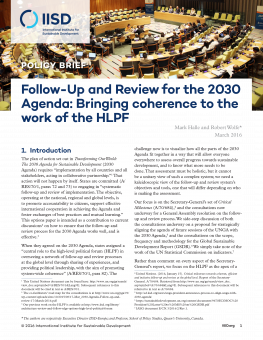
Follow-Up and Review for the 2030 Agenda: Bringing coherence to the work of the HLPF
IISD prepared this contribution to informal consultations going on in New York as the first step in a process leading to a resolution in the UN General Assembly on follow-up and review for the 2030 Agenda.
When they agreed on the 2030 Agenda, states assigned a central role to the high-level political forum (HLPF) in overseeing a network of follow-up and review processes at the global level.
The challenge now is to visualize how all the parts of the 2030 Agenda fit together in a way that will allow everyone everywhere to assess overall progress towards sustainable development, and to know what more needs to be done. IISD prepared this contribution to informal consultations going on in New York as the first step in a process leading to a resolution in the UN General Assembly on follow-up and review for the 2030 Agenda.
Participating experts
You might also be interested in
Green Public Procurement in India
This report analyzes the status of green public procurement (GPP) in India and suggests key strategies for advancing sustainable procurement practices.
Toward a Coherent, Transformative Approach to Financing Sustainable Development, Climate, and Nature
Four key proposals for the Fourth Financing for Development Conference (FfD4) to create an integrated, equitable approach to financing climate, nature, and development goals.
What Will Happen at COP 29?
Talks at the 2024 UN Climate Change Conference (COP 29) will range from defining a way forward on finance through a new collective quantified goal (NCQG) to mitigation, and loss and damage. Ahead of negotiations in Baku, IISD’s Earth Negotiations Bulletin Team Lead Jennifer Bansard examines the agenda and breaks down what to watch as eyes turn to Azerbaijan.
Addressing Liquidity Challenges: A conceptual framework
A conceptual framework for addressing liquidity challenges in sovereign debt.